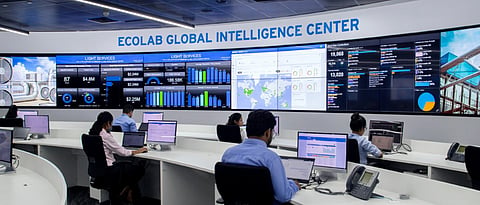Ecolab Global Intelligence Center helps steel plant improve water quality
Nalco Water, Ecolab’s water and process management business, first collaborated with a major steel plant in South Africa four years ago. The plant set out to create a smart water management strategy by implementing 3D TRASAR Cooling Water technology to optimize water use and quality. The program helped make the treatment process more efficient, but the plant needed greater support to leverage the large amounts of data that it was now collecting, such as pH levels, steel corrosion rates, water conductivity, water quality and several other data points. To turn the data into actionable insights, the plant turned to the experts at the Ecolab Global Intelligence Center (EGIC).
The EGIC is an international network of remote intelligence teams that specialize in analyzing data from a variety of connected chemistries and solutions powered by the ECOLAB3D platform. The EGIC works with Ecolab’s global network of 25,000 field sales-and-service associates to provide customer-centric support so companies can quickly act on critical information to achieve their sustainability and productivity objectives.
By collaborating with the EGIC, the steel plant aims to:
Save just under 1 million gallons of water and 86.6 million Btu of energy per year.
Reduce greenhouse gas emissions by 99 metric tons per year.
Improve water quality from 87% to 92%.
Karin Du Plessis, corporate account manager at Ecolab, explained that many companies go through a digital transformation journey that often involves digitizing their operations, harnessing data, and then learning how to put that data to good use.
“Although this steel plant had benefitted greatly by taking steps to digitalize its operations, it did not have the capability to filter such large amounts of data and drive insights to improve individual applications,” she said. “The EGIC was able to digitize a portion of the plant’s water and energy footprints and use the data to drill down on singular operations that could be optimized.”
EGIC in action
In addition to the data-driven savings that the plant achieved, the EGIC’s remote monitoring capabilities enabled the plant to respond to operational issues quickly, reducing average issue resolution time from 52 hours to 13 hours.
In one example, the EGIC team in Pune, India, was able to detect high conductivity and turbidity in a spray cooling tank. The EGIC team alerted the plant and sent a detailed alarm analysis to the facility within 60 minutes. Experts on the ground discovered the problem was oil contamination brought on by failing gaskets and aging oil skimmers. The EGIC team suggested the facility perform backwash and manual bleed-offs until the new skimmers were installed.
“In this case, the EGIC’s remote monitoring service helped the plant avoid a critical issue that could have caused a shutdown. This also led to an investigation that enabled the plant to improve an operation that will enhance water quality and efficiency over the long run,” Du Plessis said.
Monitoring for Sustainability
Water scarcity has become an escalating challenge in the last decade, and Industrial companies seek to improve water and energy consumption using digitalized tools. Water requires energy to be heated, cooled, moved and treated. By making water treatment operations more efficient, companies can reduce energy consumption and ultimately carbon emissions.
The EGIC is currently working with the steel plant to implement new water-saving projects that include adopting water management strategies. One of the projects involved reusing 50% of the water used in cooling operations, significantly reducing water and energy consumption. Before the project, the plant relied entirely on municipal water for daily operations. During the project, the EGIC identified an opportunity to treat and reuse blowdown water. As a result, the company was able to save more than 110,000 gallons of water in just four months. In a year’s time, the plant could reduce greenhouse gas emissions equivalent to the CO2 absorbed 4,100 trees over the course of a decade.
“By combining digital solutions powered by ECOLAB3D with EGIC expertise, we can deliver a connected solution that leads to deeper insights, faster action and greater value,” Du Plessis said. “We believe that data access and visibility allow companies to advance their business goals while taking concrete steps towards safer and more sustainable operations.”

